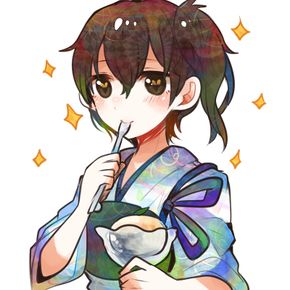- Welcome to the Kancolle Wiki!
- If you have any questions regarding site content, account registration, etc., please visit the KanColle Wiki Discord
User:McCornflake
Well, I am an anime, games and Kantai fan. I usually spent my days playing KanColle.
My favorite characters are Shimakaze and Kitakami, I also like Kaga( because she is kuudere) and Kiso very much (and many more).
I don't have much experience when it comes to editing pages, so I will try to learn as much as possible with other articles.
(Sorry for my poor english, please!)
Kiso
Kiso (木曾?) was the fifth and last of the five Kuma-class light cruisers, which served with the Imperial Japanese Navy during World War II. She was named after the Kiso River in central Honshū, Japan.
After the construction of the Tenryū-class cruisers, the demerits of the small cruiser concept became apparent. At the end of 1917, plans for an additional six Tenryū-class vessels, plus three new-design 7200 ton-class scout cruisers were shelved, in place of an intermediate 5,500 ton-class vessel which could be used as both a long-range, high speed reconnaissance ship, and also as a command vessel for destroyer or submarine flotillas. Kuma was the lead ship of the five vessels in this class which were built from 1918-1921.
- See the article of this character inKiso
[[Template: Infobox
Tenryuu
Tenryū (天龍?) was the lead ship in the two-ship Tenryū-class of light cruisers of the Imperial Japanese Navy. Tenryū was named after the Tenryū River in Nagano and Shizuoka prefectures.
The Tenryū class was designed to act as flagships for destroyer flotillas. The design represented an intermediate class between the light cruiser and the destroyer, which had few counterparts in other navies of the time, although it was inspired by a similar concept to the Royal Navy Arethusa class and C-class cruisers. The Imperial Japanese Navy and Japanese shipbuilding industry were still closely associated with the British due to the Anglo-Japanese Alliance, and were able to improve on the British experience.
- See the article of this character in Tenryuu
I-58
I-58 was a Japanese B3 type cruiser submarine that served in the final year of World War II. Modified to carry Kaiten manned torpedoes, she damaged two enemy destroyers with them[dubious – discuss], but her most significant success was the USS Indianapolis, sunk with conventional torpedoes on 30 July 1945. The submarine surrendered in September 1945, and was later scuttled by the United States Navy.
The submarine was laid down on 26 December 1942 at the Yokosuka Naval Arsenal, and launched on 30 June 1943. During construction her 14 cm/40 11th Year Type naval gun was removed, making room for four Kaiten manned suicide torpedoes. The submarine was completed on 7 September 1944 and command was given to Kaigun Shōsa (Lieutenant Commander) Mochitsura Hashimoto. I-58 was assigned to the Sixth Fleet's Submarine Squadron 11 for training in the Inland Sea before being assigned to the 15th Submarine Division on 4 December 1944. A few days later she was assigned to the Kongo ("Diamond") group, with I-36, I-47, I-48, I-53 and I-56, to launch Kaiten attacks on five different U.S. fleet anchorages. I-58 was assigned to attack Apra Harbor, Guam.
- See the article of this character in I-58

